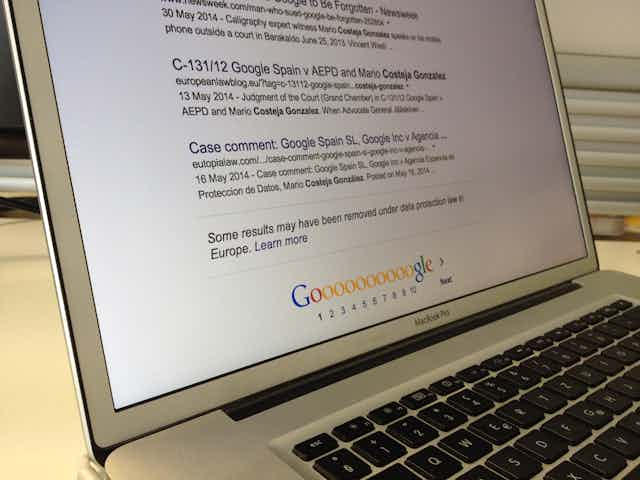The May 2014 ruling by the European Court of Justice, dubbed the right to be forgotten, is seen as a precedent for all internet searches in all European Union member states. But the issues this ruling tries to address could be better dealt with using practices that exist.
The implications of the ruling are that publishers do not have to redact history by removing personally embarrassing or inconvenient reports from their web pages or online archives. Instead, search results to those pages will be removed.
Google has responded by putting a general disclaimer at the bottom of results pages for such searches: “Some results may have been removed under data protection law in Europe”. This implies that links have been deleted from a personal name search, even when this is not the case. It also implies that other searches are not modified in some way. But neither of two implications are quite true.
Eli Pariser in his book The Filter Bubble: what the internet is hiding from you talks about instances where two individuals with a similar demographic do an identical search and get very different results. This “filtering” of results is a normal part of the profiling of individual searchers and tailoring of results to accord with their preferences or worldview.
Google tries to arbitrate on each request under the “right to be forgotten” rather than referring the matter to the data protection regulators in EU member states. Individuals can complete a form on the Google website where they can: identify themselves, identify the web pages that are problematical, and give reasons for requesting removal of the links. This has opened the floodgates and in the first five weeks Google has had 250,000 requests from 70,000 people to remove links.
The right to be forgotten also raises questions about freedom of information, privacy and rehabilitation of offenders. Taken together they show that such a law is ineffective when other means to deal with libel or privacy issues exist.
For instance, few would deny that it is in the public interest to maintain links between the name of a public individual such as a politician or senior official and factual news reports in the press. Inconvenient past statements and behaviour should be a matter of public record and officials and politicians should be accountable, even if their attitudes have since changed.
But public figures are also people. And people have human rights including the “right to a private and family life”. Trying to maintain privacy raises practical difficulties in taking down material that is no longer relevant or up to date.
Once something has been published there is an absurdity in trying to “unpublish” it, especially when there are alternative legal remedies to deal with breaches of trust or libel. In the Max Mosley case damages of £60,000 were awarded against the News of the World in 2008 for breach of privacy following publication of a story based on a secret video of sexual nature. It demonstrated that libel laws and press regulation can be used to address privacy concerns and that additional privacy legislation is probably not necessary.
Finally, there is a powerful principle of reintegrating offenders into the community. This requires some kind of forgiveness by society once a sentence has been served. For instance, if an ex-offender is applying for a job, in the UK they do not have to declare spent convictions. The law does not allow employers to discriminate against them, if for instance they discover details of a spent conviction from an internet search about the candidate.
The other side of the argument is that perhaps the employer has the right to know the history of an employee. Employers should be able to form their own view on the suitability of a candidate in light of all relevant information, rather than having their access to information restricted.
It is not possible to rewrite history. Once something has been said, it cannot be “unsaid”. This is particularly true in the digital world, where there is effectively no control over the distribution or storage of information that has appeared on the internet. While respecting individual rights, we must balance this against public accountability and use existing remedies for dealing with inaccuracies, breaches of confidentiality, and discrimination. Perhaps the right to be forgotten should really have been forgotten in the interests of a more practical, just and workable data protection regime in Europe.
For a counterpoint, read this: The right to be forgotten is fundamental in the digital age

